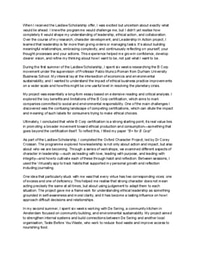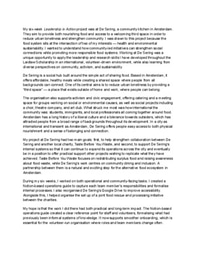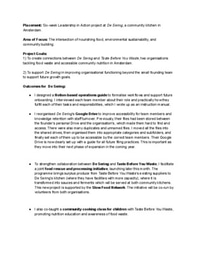Overall Laidlaw Scholarship
When I received the Laidlaw Scholarship offer, I was excited but uncertain about exactly what would lie ahead. I knew the programme would challenge me, but I didn’t yet realise how completely it would shape my understanding of leadership, ethical action, and collaboration. Over the course of my research, character development, and Leadership In Action project, I learned that leadership is far more than giving orders or managing tasks. It’s about building meaningful relationships, embracing complexity, and continuously reflecting on yourself, your thought processes and your actions. This experience helped me grow in confidence, develop clearer vision, and refine my thinking about how I want to be, not just what I want to be.
During the first summer of the Laidlaw Scholarship, I spent six weeks researching the B Corp movement under the supervision of Professor Pablo Munoz-Roman from Durham University Business School. My interest lay at the intersection of economics and environmental sustainability, and I wanted to understand the impact of ethical business practice improvements on a wider scale and how this might be one useful level in resolving the planetary crisis.
My project was essentially a long-form essay based on extensive reading and critical analysis. I explored the key benefits and limitations of the B Corp certification, which aims to mark companies committed to social and environmental responsibility. One of the main challenges I discovered was the confusing landscape of competing certifications, which can dilute the impact and meaning of such labels for consumers trying to make ethical choices.
Ultimately, I concluded that while B Corp certification is a strong starting point, its real value lies in promoting a broader movement toward ethical production and consumption—something that goes beyond the certification itself. To reflect this, I titled my paper “B+ for B Corp”
As part of the Laidlaw Scholarship, I completed the Oxford Character Project, led by Dr Corey Crossan. The programme explored how leadership is not only about action and impact, but also about who we are becoming. Through a series of workshops, we examined different aspects of character in leadership —such as leading with love, leading with purpose, and leading with integrity—and how to cultivate each of these through habit and reflection. Between sessions, I used the Virtuosity app to track habits that supported my personal growth and reflection including journaling.
One idea that particularly stuck with me was that every virtue has two corresponding vices: one of excess and one of deficiency. This helped me realise that strong character does not mean acting precisely the same at all times, but about using judgement to adapt them to each situation. The project gave me a framework for understanding ethical leadership as something grounded in self-awareness and moral clarity, and it has become a lasting influence on how I approach difficult decisions and relationships.
In my second summer, I spent six weeks working with De Sering, a community kitchen in Amsterdam focused on community building, and environmental sustainability. My project aimed to strengthen internal systems and build connections between De Sering and another local organisation, Taste Before You Waste, who work to reduce food waste and improve access to nourishing food.
This experience gave me insight into the often invisible systems that sustain grassroots organisations. I learned how to lead through listening, collaboration, and practical problem-solving—skills that I know will shape the way I work in future.
Looking back over the program as a whole, the Laidlaw Scholarship has helped me think in new ways and see myself as someone who has a part to play in the changes we want to see in the world going forward.. I’ve gained confidence in my ability to navigate unfamiliar challenges—whether researching a new academic field, building systems for a grassroots organisation, or thinking deeply about the kind of leader I want to be.
Throughout the programme I came to see again and again that leadership is as much about inner development as it is about outward action. The Oxford Character Project helped me understand this on a personal level, and both my research and LiA taught me how to apply those values practically. I’ve learned that good leadership is grounded in curiosity, clarity of values, and the ability to bring others with you. Therefore one can demonstrate leadership no matter their position or job title.
I’m incredibly grateful to have been part of a community of scholars who are committed to making a meaningful impact. The Laidlaw experience has shaped not just what I want to do, but who I want to be.



Please sign in
If you are a registered user on Laidlaw Scholars Network, please sign in